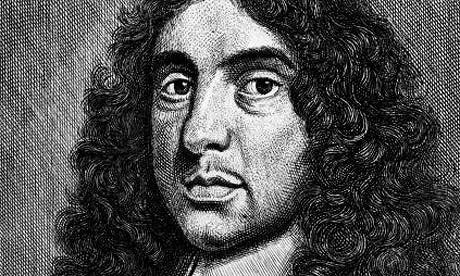Due to the inconsistencies and ambiguities within his work and the scarcity of information about his personal life, Andrew Marvell has been a source of fascination for scholars and readers since his work found recognition in the early decades of the twentieth century. Born on March 31, 1621, Marvell grew up in the Yorkshire town of Hull, England, where his father, Rev. Andrew Marvell, was a lecturer at Holy Trinity Church and master of the Charterhouse. At age twelve Marvell began his studies at Trinity College, Cambridge. Four years later, two of Marvell’s poems, one in Latin and one in Greek, were published in an anthology of Cambridge poets. After receiving his bachelor’s degree in 1639, Marvell stayed on at Trinity, apparently to complete a master’s degree. In 1641, however, his father drowned in the Hull estuary and Marvell abandoned his studies. During the 1640s Marvell traveled extensively on the continent, adding Dutch, French, Spanish, and Italian to his Latin and Greek—missing the English Civil Wars entirely.
Marvell spent most of the 1650s working as a tutor, first for Mary Fairfax, daughter of a retired Cromwellian general, then for one of Oliver Cromwell’s wards. Scholars believe that Marvell’s greatest lyrics were written during this time. In 1657, due to John Milton’s efforts on his behalf, Marvell was appointed Milton’s Latin secretary, a post Marvell held until his election to Parliament in 1660.
A well-known politician, Marvell held office in Cromwell’s government and represented Hull to Parliament during the Restoration. His very public position—in a time of tremendous political turmoil and upheaval—almost certainly led Marvell away from publication. No faction escaped Marvell’s satirical eye; he criticized and lampooned both the court and Parliament. Indeed, had they been published during his lifetime, many of Marvell's more famous poems—in particular, “Tom May's Death,” an attack on the famous Cromwellian—would have made him rather unpopular with royalists and republicans alike.
Marvell used his political status to free Milton, who was jailed during the Restoration, and quite possibly saved the elder poet’s life. In the early years of his tenure, Marvell made two extraordinary diplomatic journeys: to Holland (1662–63) and to Russia, Sweden, and Denmark (1663–65). In 1678, after eighteen years in Parliament, Marvell died rather suddenly of a fever. Gossip from the time suggested that the Jesuits (a target of Marvell’s satire) had poisoned him. After his death, he was remembered as a fierce and loyal patriot.
Now considered one of the greatest poets of the seventeenth century, Marvell published very little of his scathing political satire and complex lyric verse in his lifetime. Although he published a handful of poems in anthologies, a collection of his work did not appear until 1681, three years after his death, when his nephew compiled and found a publisher for Miscellaneous Poems. The circumstances surrounding the publication of the volume aroused some suspicion: a person named “Mary Marvell,” who claimed to be Marvell’s wife, wrote the preface to the book. “Mary Marvell” was, in fact, Mary Palmer—Marvell’s housekeeper—who posed as Marvell’s wife, apparently, in order to keep Marvell’s small estate from the creditors of his business partners. Her ruse, of course, merely contributes to the mystery that surrounds the life of this great poet.
Andrew Marvell died on August 16, 1678.
-bio via Academy of American Poets
Get full access to The Daily Poem Podcast at
dailypoempod.substack.com/subscribe

 Play
Play
